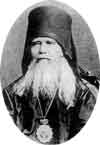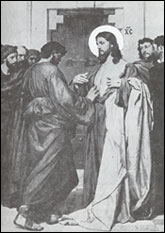 |
 |
|
 |
 |
|
|

Saint Theophanus
the Recluse. |
As ye believe so shall it be unto you, said the Lord to the two blind men, and immediately their eyes opened. The amount of divine energy that is attracted corresponds directly to the amount of faith that is possessed. Faith is the receiver, the mouthpiece and the receptacle of grace. Just as one person’s lungs are large, while another’s are small, and the first one can draw in more air than the second, so one person has great faith, while another has little, and the first receives more bounties from the Lord than the other. God is everywhere, encompasses and contains everything, and likes to dwell in the hearts of men; however, He does not enter them by force, even though He is Almighty, but waits to be invited, because He does not want to violate the freedom which He gave to man, nor man’s right to be his own master. Whoever opens himself up to faith is overfilled with God, while whoever has locked himself into disbelief, God does not enter into him, even though He may be near. O Lord! Grant us faith in Thee, for faith, too, is Thy gift.
|
|
| Saint Theophanus the Recluse. |
|
What is needed for attaining eternal bliss.
|
|
Once, says monk Athanasius, I had the following thought: what awaits in the next life those who toil here for their salvation? With this thought I felt myself as though in rapture, and someone came to me and, saying - follow me, led me to a wondrous place filled with light, and set me in front of such wondrous doors that their beauty cannot even be described. And I heard a great multitude of people behind the doors, glorifying God incessantly. Truly, brothers, life in the Heavenly Realm is wondrous and indescribable! People there shine like the sun in the kingdom of the heavenly Father; there they have peace and joy in the Holy Spirit; there they serve the Lord and look upon His face. And there is no night there, and there is no need of lights or sunlight, for the Lord illuminates them. Finally, there are such delights and joys there, that we cannot even imagine.
Wondrous are the doors that lead into this life, ineffably blissful is the life itself! But who will enter into it? An answer is given by the same monk Athanasius, who continues his narrative: “When we (i.e. he and his guiding angel) began to knock on the doors with the purpose of entering them, someone asked us from inside: what do you want? My guide answered: we want to enter through the doors. The voice from inside said to us: no one who lives in idleness can enter here; but if you wish to enter, go back and spend your time in spiritual labors, shunning all thoughts of vain worldly delights.”
Thus, brethren, you see what is needed to enter the doors of paradise - spiritual labors, described in the Gospel for our salvation by the Lord Himself, and the abandonment of all predilection for those things which cause us to forget God and our future assignment. The Kingdom of Heaven is taken by force, and only those who make the effort attain it (Matt. 11:12), says the word of God. And for this reason you should labor constantly for your salvation, struggle for it, do not yield to the vices and temptations of the world, act in accordance with the Lord’s commandments, - and the doors of the Heavenly Realm will be opened to you. Amen.
Protopriest Victor Guryev - “Prologue in homilies”.
|
|
“I am ready.” (Romans 1:15)
I am ready to serve, ready to suffer, ready to die - this is what Apostle Paul was getting ready for! May God grant us a similar readiness for everything which concerns God’s will for us. Apostle Paul’s conversion was total, irrevocable. He did not waver, he did not ask others for advice, did not seek approval from others, did not barter with his conscience, did not stand indecisively on the threshold of duty. His life’s endeavor stretched before him and, striding firmly towards it, he says: “I am ready!” To enter into the very midst of the pagan world, for a personal and direct battle with paganism, was quite difficult. But without hesitating even for a minute in the face of such a feat, Paul says: “I am ready to preach the Gospel to you that are at Rome also,” and he was equally ready to endure anything, in order to fulfill the will of God.
At that time Jerusalem was the place of execution of Christ’s holy followers, inevitable danger awaited them there, but Paul was “ready to die in Jerusalem”; and when he finally stood face-to-face before death, he was ready to sacrifice himself, ready to give up his life for his convictions. The supreme characteristic of Apostle Paul is precisely this readiness to walk steadily towards his duty, be it suffering or even death. May the Lord grant everyone of us such readiness!
|
|
From a book of spiritual reflections, “Day after day”.
|
|
|
Thomas’ disbelief
|
|
The joyous days of the bright paschal week have passed. The Church has closed the royal doors of its altars and has directed our mind’s and heart’s gaze towards seeing how the world accepted the news of Christ’s Resurrection.
And the first image that the Church offers to us is the image of the doubting Thomas.
The great and incomprehensible truth of Christ’s Resurrection could not be grasped by the mind of man, and thus could truly become for him a stumbling block and a source of incredulity. But at this point the nature of disbelief is revealed to us.
“Usually,” - says a Christian philosopher, - “truths of faith are rejected in advance not because of coarseness of mind, but because of corruption of the will. There is no heartfelt attraction towards such objects as God, salvation of the soul, resurrection of the body; there is no desire to have such truths truly exist or, at the least, to regard them seriously… Such disbelief, essentially uncertain of itself and, therefore, more or less set against the objects whose existence it denies, - gives itself away through this hostility, since one cannot really be set against that which does not exist at all, - such disbelief is unscrupulous…” But the disbelief, or rather the doubt, of Apostle Thomas was quite different. He wanted to believe, he tried to believe, he sought confirmation of his belief.
|
|
And Christ the Saviour, Who never appeared amid offensive and stubborn disbelief, condescended to Thomas’ frailty and personally confirmed His resurrection to him.
This image is quite instructional for all of us of course, but it is especially relevant to those who suffer disbelief, who are tortured by a weak and shaky faith.
Above all we must guard ourselves against allowing our sinful will to seek an outlet for itself in this spiritual frailty. After all, it is much easier to live without faith. Faith requires intense pressure, requires spiritual labor, while disbelief unties one’s hands for many things.
Thus, brother Christian, if you feel that your faith is becoming scarce, realize that the cause of this lies not in the objects of faith, but in your own limitations. And if you understand this, then God will enlighten you as He had enlightened Apostle Thomas, and will condescend to you as He had condescended to the latter’s frailty. Amen.
|

Apostle Thomas
tests the Lord's wounds. |
|
Hieromonk Methodius.
|
|
|
|
|
|
|
|
 |